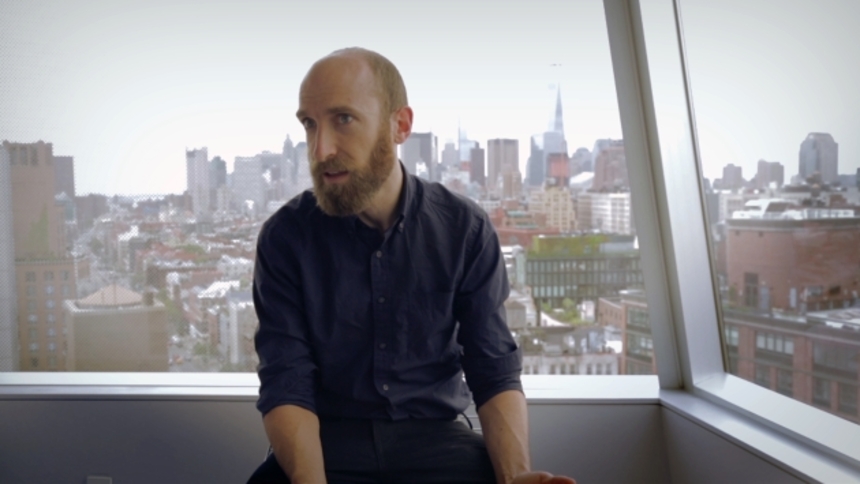Hot Docs 2015 Review: DEEP WEB Examines Justice On The Electronic Frontier

This is the stuff of a Neil Stephenson science fiction novel (title suggestion: "Cypherpunk.") Here is where we are.
Director Alex Winter, once the actor who played Bill S. Preston (Esquire), has been enjoying a career resurgence as a director, most recently unpacking the dense legal and philosophical complexities of the internet and society. His 2013 documentary Downloaded offered a digest of the issues concerning online file sharing, copyright law, and the titanic upheaval of the music industry catalyzed by very young college kids. Continuing along these lines, with an even clearer focus and purpose, Deep Web examines the repercussions of The Silk Road. After half a year of development, the online marketplace popped up on the underside of the internet (more accurately, data stores that are not indexed by search engines often referred to as the Darknet) in early 2011 much to the shock and chagrin of law enforcement and Congress.
Enabled by technologies such as Tor, an open source program which allows for anonymous data flow when browsing the web, and Bitcoin, the now quite popular crypto-currency that allows for online transactions not regulated by government or big banks, The Silk Road became the eBay of narcotics, and ersatz community for idealistic political ideology leavened with a bit of old fashioned commerce. Predominately on the minds of the administrators, was the unconditional freedom from surveillance, world governments and international law in the online Wild West, if you can forgive me using that now quite hoary metaphor.
While the film is narrated by Keanu Reeves (the former Ted 'Theodore' Logan doing his Wyld Stallyns mate a solid), it is actually Wired/Forbes reporter Andy Greenberg who guides us on the journey through to the story of the Dread Pirate Roberts. Yes, The Princess Bride character, or rather, job description, of which Carey Elwes' swashbuckling romantic was one of many under the banner of happy anarchist in Rob Reiner's film is the also the handle of The Silk Road forum administrator(s). One of whom, the feds managed to attach a name to is Ross Ulbricht, who was arrested in a San Francisco Public Library in 2013, with The Silk Road website open on his browser while he was making use of the public Wi-Fi.
Ulbricht's personal history, as well as his ongoing criminal trial form the narrative arc of Deep Web, and is as up to the minute as a documentary can reasonably be; many trial scenes and interviews, including the February verdict, were shot in 2015. And sentencing will happen May 15th, only days after the North American premiere of this film. (I.e. when this review is posted.) In a Kafka-esque twist, the nature of how the Feds caught up with Ulbricht, whether they were legal search and seizures, or a flat out case hacking the hackers with government resources, not to mention allegations of Ulbricht hiring a hitman via The Silk Road to take out another site administrator which colour the case without being addressed directly, all play into public perception with little repercussion on the moral authority of the mix of federal agencies involved, from the FBI to the DEA to the NSA, and of course, Department of Homeland security. There are virtual mountains of online articles should people leaving the film wish to go deeper and Deep Web gives you the framework to do so.
Making sense of the all issues at hand, the people and organizations involved and media coverage (from magazine features to cable news) as events unfold, is no small feat. Winter, with efficient and sparing use of motion graphics, news clips, online headlines, and camera crews doing on-camera interviews from online thinkers from around the world, manage to wrangle things into a pretty tight narrative which settles on over-reach of government power.
NSA whistle-blower Edward Snowden and Wikileaks founder Julian Assange make cameos. The very photogenic Ulbricht, who bears uncanny resemblance Robert Pattinson, was unable to do an interview from prison, but his parents, sister and friends paint a substantially different portrait of his life from the narrative of the government, media and court prosecutors. Despite footage of home movies and family photos, and a daring and intelligent set of parents, he remains kind of a ghost throughout the elaborate legal process. In a large ideological war, Ulbricht is somewhat of a blank canvas for governments and online activists to graft their one images and ideals upon -- Not unlike, for instance, Snowden and Assange, albeit slightly more passive in action.
Deep Web tackles ethics, ethos, politics, The War on Drugs, miscarriages of justice, arrogance, agorism and naïveté (on all sides), online communities, government, technology, and while the film clearly has a position on many of these subjects, it makes the idea of condensing things into a narrative without sacrificing the nuance look far easier than it ought to be. That fact that this is possible, and seemingly in real-time, does indeed make the 21st century a strange new land.

Do you feel this content is inappropriate or infringes upon your rights? Click here to report it, or see our DMCA policy.






